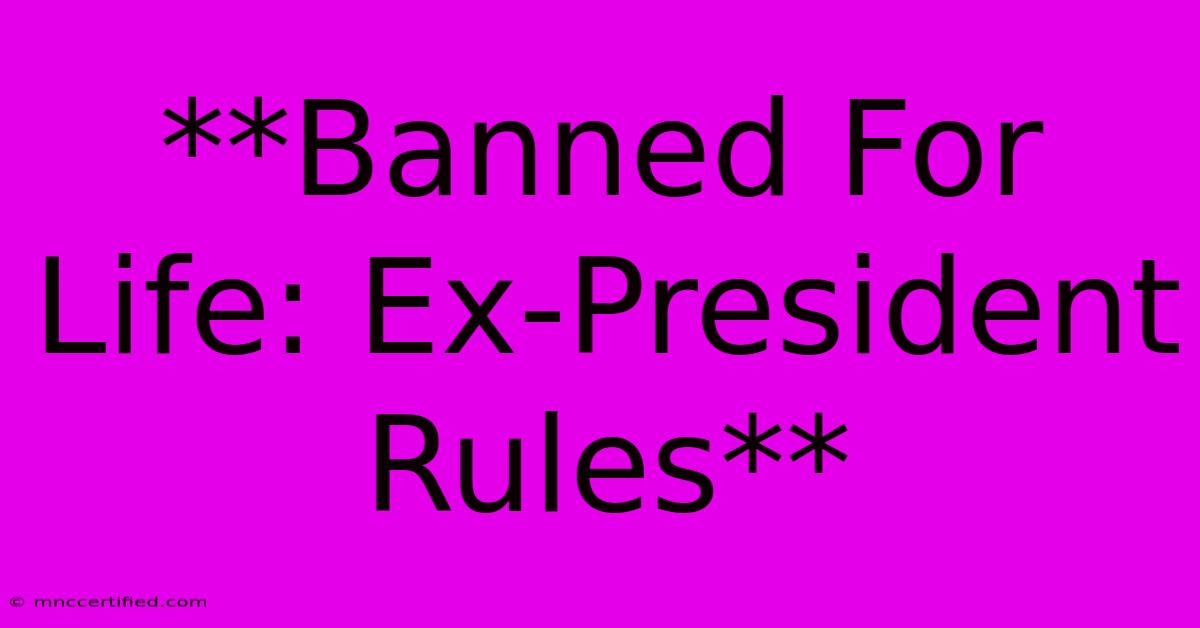**Banned For Life: Ex-President Rules**

Table of Contents
Banned for Life: Ex-President Rules - A Global Trend and Its Implications
In recent years, a fascinating trend has emerged in global politics: the banning of former presidents from political activity. This practice, often referred to as "ex-president rules," has raised numerous legal, ethical, and political questions. This article delves into the reasons behind these bans, the specific rules in place across various nations, and the broader implications for democratic governance.
Why Ban Ex-Presidents?
The rationale behind banning ex-presidents from political life is multifaceted and often intertwined with a country's specific historical context. Here are some common reasons:
- Preventing Abuse of Power: Concerns arise that former presidents may exploit their past influence, connections, and access to resources to gain an unfair advantage in future elections or political maneuvers.
- Protecting Democracy: These rules are often seen as a safeguard against the rise of authoritarianism or the concentration of power in the hands of a single individual or family.
- Promoting Fairness: By restricting the influence of former presidents, elections can be seen as more fair and democratic, allowing for greater participation and representation.
- Accountability and Transparency: Some nations use these rules to encourage greater accountability and transparency from former presidents, preventing them from escaping scrutiny for their actions while in office.
A Global Overview: Ex-President Rules Across the World
Latin America: Several Latin American countries have strict rules barring ex-presidents from holding public office, running for re-election, or engaging in political campaigning.
- Brazil: Former presidents cannot hold any public office for eight years after leaving office, and they are barred from running for the same position in the subsequent election.
- Argentina: The constitution prohibits ex-presidents from holding any elected office for eight years after the end of their term.
- Bolivia: Former presidents cannot run for the same position again or hold any other public office.
Asia:
- Pakistan: While no specific ban exists, the country's political landscape often sees former presidents facing legal or political hurdles in their return to power.
- South Korea: Ex-presidents are not explicitly barred from holding office, but the country's history of corruption and political scandals often limits their ability to return to power.
Africa:
- Kenya: While no specific ban exists, there are laws against abuse of power and corruption that could be applied to former presidents.
- Nigeria: The constitution does not restrict former presidents from holding office, but the political climate often makes a return to power challenging.
Europe:
- France: Former presidents can hold public office, but their participation is often subject to public scrutiny and debate.
- Germany: No explicit ban exists, but the country's strong democratic institutions and legal framework typically prevent the rise of power-hungry figures.
The Debate: Arguments For and Against
Arguments for Bans:
- Preventing Corruption and Abuse of Power: Banning former presidents can limit their ability to leverage their influence for personal gain or to interfere in political processes.
- Promoting Fair Elections: These rules can create a level playing field for other politicians, ensuring that elections are conducted fairly and transparently.
- Enhancing Democratic Institutions: By limiting the power of former presidents, bans can strengthen democratic institutions and prevent the concentration of power in the hands of a few.
Arguments Against Bans:
- Restricting Freedom: Some argue that banning former presidents from political participation violates their freedom of expression and right to participate in the political process.
- Discrimination: These rules can be seen as discriminatory, unfairly targeting a specific group of individuals based on their past position.
- Limited Effectiveness: Some critics argue that such bans are often ineffective, as former presidents can still influence political decisions through other means, such as lobbying or party affiliations.
Conclusion: A Complex Issue with No Easy Answers
The debate surrounding ex-president rules is complex and multifaceted. While these rules aim to protect democracy and prevent abuse of power, they also raise concerns about individual rights and the effectiveness of such restrictions. Ultimately, the implementation and efficacy of these bans depend on the specific context and political culture of each country.
It's important to note that this is a constantly evolving issue, and new developments are likely to emerge in the future. As political systems around the world adapt to the challenges of governance, the debate over ex-president rules will continue to be a key area of discussion and scrutiny.

Thank you for visiting our website wich cover about **Banned For Life: Ex-President Rules**. We hope the information provided has been useful to you. Feel free to contact us if you have any questions or need further assistance. See you next time and dont miss to bookmark.
Featured Posts
-
Malpractice Insurance For Anesthesiologist
Nov 07, 2024
-
Shetland Star Speaks On Episode 1s Shocking Twist
Nov 07, 2024
-
Barcelona Vs Estrella Roja All Champions League Goals
Nov 07, 2024
-
Bayern Vs Benfica Kickoff Live Now
Nov 07, 2024
-
Left Keys In Car Stolen Will Insurance Pay
Nov 07, 2024